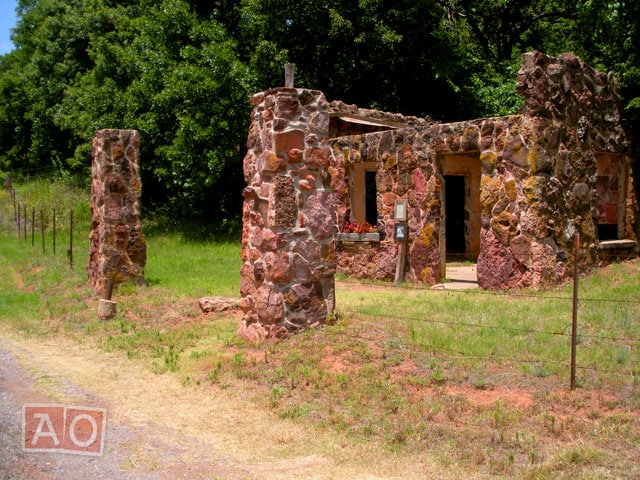| City/Town: • Arcadia |
| Location Class: • Commercial |
| Built: • 1920's | Abandoned: • N/A |
| Status: • Restored |
| Photojournalist: • AbandonedOK Team |
No one knows for sure, but it is thought that the Historic Route 66 Filling Station was built in the late teens or early twenties. It had two pumps, one for regular gas and one for ethyl, which was a little higher octane. Oil was dispensed from a 50-gallon drum, which was laid down on its side on a wooden frame. A spigot was put in the end of the drum, under which you put a quart can then taken to your car and put in the motor.
Seeing there was no electricity out here at that time, most homes and buildings were lighted by kerosene lamps or lanterns. Kerosene was dispensed the same way oil was from a metal drum, put in your container and taken home.
Cold soda pop was sold only on days when the iceman made it by. The pop was put in a large metal box with chipped ice over it. Hard candy was sold most of the time; chocolate was sold only in the winter because in the summer it would melt—since there were no refrigerators.
Back then, times were very hard and it was difficult to make a living. One day, about the time Al Capone was terrorizing the City of Chicago, a so-called salesman came by the station, offering to sell the owners a way to make a lot of money, literally, for he had a set of plates for a counterfeit ten-dollar bill. The story goes that the people yielded to temptation, with the thought of being able to get rich quickly.
A small room was constructed on the back of the old station for the purpose of hiding the printing materials and a place to work. The only entrance was through a window you see on the back wall of the station. The window had a solid wooden door, which was kept closed most of the time. People didn’t even know that there was a room back there.
The way the counterfeiting was done was that they would press one of the plates on a piece of paper with the green ink on it, then let that side dry 24 hours, and print the black side of the bill the next day. Things went along just fine for a time, but while passing one of the fake ten-dollar bills, one of the persons was arrested, and with the identification on him where he lived, he was traced to the old station. While searching the building, counterfeit plates were found. So ended this crime spree, like so many others. The person being taken to jail was overheard saying, “It wasn’t worth it!”
The old station was closed, never to open again. Many years later, which had nothing to do with the counterfeiting, a murder victim was found in the old abandoned building. Police were unable to determine whether he was killed there or the body just dumped, for he had no identification on him and on one seemed to know him.
Gallery Below of Historic Route 66 Filling Station
If you wish to support our current and future work, please consider making a donation or purchasing one of our many books. Any and all donations are appreciated.
Donate to our cause Check out our books!




















Cool and awesome post. Thanks for the sharing with us.
amazing site.
I passed this two years ago while doing a partial route 66 tour. It intrigued me so much I had to turn around and go back to look at it. I was so fascinated with the history and story about it. I wondered and was sad that it wasn't in the Oklahoma route 66 guide. I wondered how many other historical things I may have missed along my route that wasn't in the guide. This was certainly along the road of route 66.
my dad could tell you more about this place.he said him and my grandfather used to stop here all the time when my dad was little. I live in Luther so i pass this place every day going to work or going in to Edmond. i think its just the coolest place!
i have always wondered what this was and always got an eerie feeling as I drove past. Thanks for sharing.
There use to be a geocache here.
i love live history such as this, old abandoned buildings. would love to tour some someday.
I remember when 66 west out of Chandler was littered with these rock buildings.